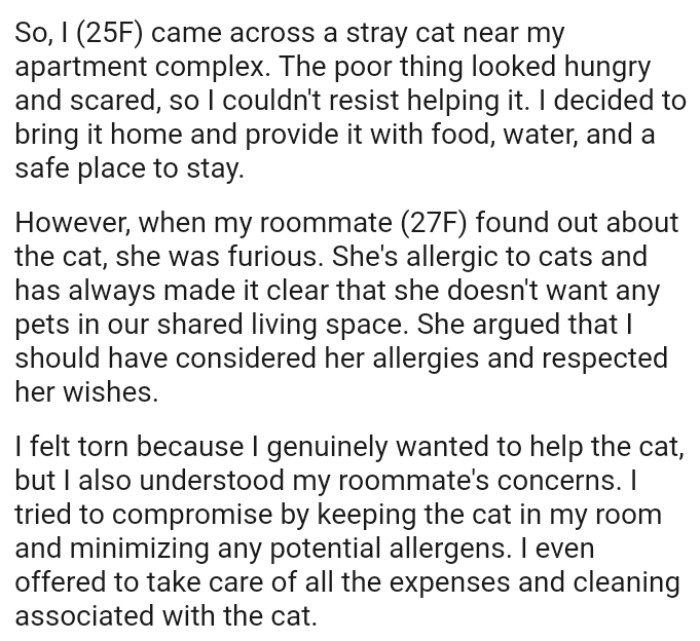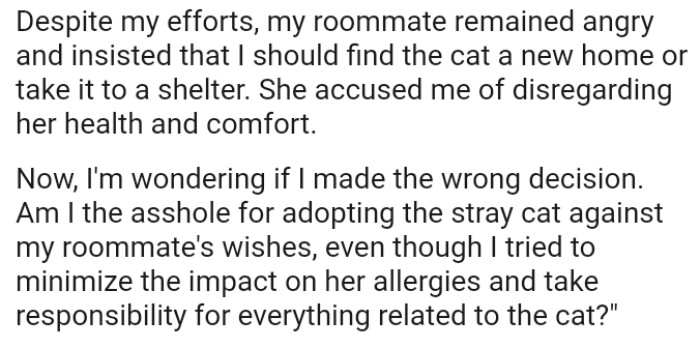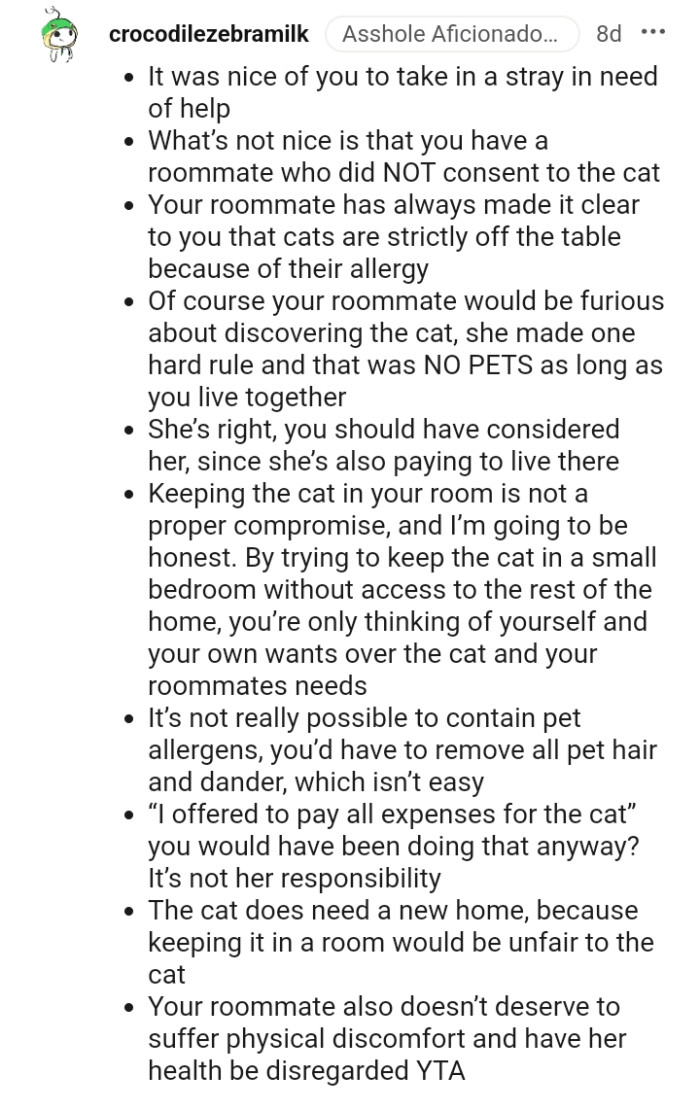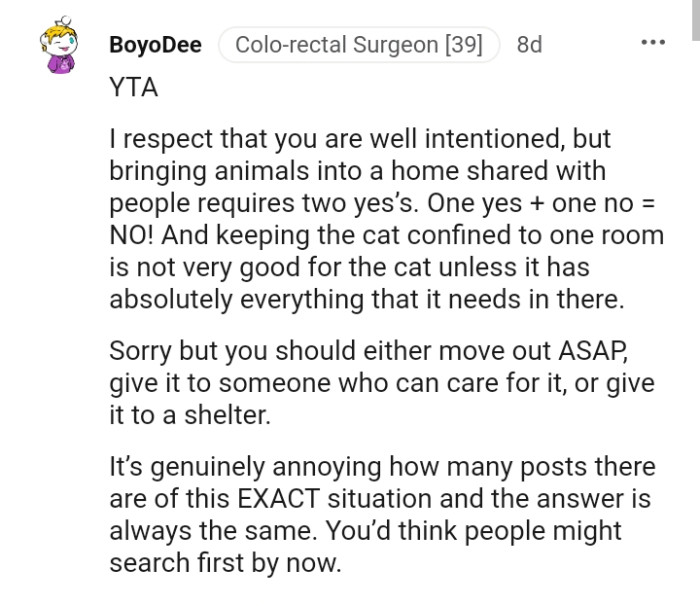Lady Brings In A Stray Cat Against Her Roommate's Wishes, Gets Roasted By People Online
Pet dander, saliva, or urine can be serious irritants for those who suffer from allergies to animals. It can be uncomfortable to enter a pet-friendly home when your body isn't so pet-friendly, as evidenced by symptoms such as sniffly noses, watery eyes, and continuous sneezing.
There is some hope for those who avoid cats out of concern for allergic reactions, even though some people do so because they fear or loathe cats. Much will depend on the type of allergy the person has.
If your allergies manifest as sneezing, watery eyes, and a runny nose, you might be able to gradually increase your tolerance for cats. The OP of today's story has a roommate who is allergic to cats, and she has always stated that she doesn't want any pets in their shared living space.
The OP came across a stray cat near her apartment complex. The poor thing looked hungry and scared, so the OP couldn't resist helping it.
She decided to bring it home and provide it with food, water, and a safe place to stay. Her roommate found out and argued that the OP should have considered her allergies and respected her wishes.
This was a tough decision for the OP, as she genuinely wanted to help the cat. Read the entire story to find out what happens next.
The OP kicks off her story with this title

She's allergic to cats and has always made it clear that she doesn't want any pets in their shared living space

OP's roommate accused her of disregarding her health and comfort, and the OP felt torn about the situation

Compassion in Decision-Making
Compassionate decision-making is essential when navigating conflicts that involve shared living arrangements. Research from the American Psychological Association emphasizes that emotional intelligence plays a significant role in how decisions affect others. In this case, bringing a stray cat into a shared space without consulting the roommate can lead to feelings of resentment and conflict.
Understanding the emotional impact of decisions on others is crucial for fostering a harmonious living environment. Encouraging open discussions about shared responsibilities can prevent future misunderstandings.
The Emotional Impact of Pet Ownership
Bringing a pet into a home can evoke a range of emotions, both positive and negative. Research in animal-assisted therapy has shown that pets can provide comfort and companionship, enhancing emotional well-being. A study published in the Journal of Psychological Science indicates that pet ownership is associated with decreased feelings of loneliness and increased feelings of happiness.
However, these benefits can be complicated when pet ownership conflicts with the preferences of others in the household.
Understanding Emotional Attachment
Dr. Emily Chen, a developmental psychologist at Stanford, points out that bringing a stray pet into a shared living space can reveal underlying emotional attachment styles.
Her research indicates that individuals who experience a strong attachment to animals may see them as sources of comfort and security, especially during times of conflict or stress.
This dynamic can often clash with the expectations of roommates who may not share the same level of empathy or understanding toward animals, leading to conflict.
Here are some of the comments from other Redditors in response to the story

The OP cannot just keep a cat trapped in a room

The OP's roommate's well-being should come first before a cat's

The backlash faced online highlights how social media can amplify conflicts and create additional stress. According to research published in the Journal of Computer-Mediated Communication, online platforms can exacerbate interpersonal disputes by encouraging negative feedback and groupthink. This can lead to feelings of isolation and frustration for those involved.
Engaging in constructive conversations offline can help mitigate the negative effects of online backlash. Encouraging face-to-face discussions can foster a more supportive environment for resolving conflicts.
When conflicts arise over pet ownership, they can trigger strong emotional responses, particularly if one party feels their needs are not being considered. Dr. Ramani Durvasula, a clinical psychologist, emphasizes that "feeling unheard can lead to increased anxiety and frustration in relationships." Addressing these feelings openly can facilitate healthier communication and resolution, as noted on her website drramani.com. Creating a space for dialogue about each person's needs and concerns can help mitigate conflicts and foster understanding.
Social psychologists have shown that our behavior in shared living situations often reflects deeper relational patterns, such as the balance of power and negotiation skills. According to Dr. John Gottman, a renowned marriage researcher, "How we manage conflicts over shared resources, like pets, can reveal our underlying communication styles and conflict resolution abilities." Understanding these dynamics can often lead to more constructive conversations about boundaries and shared responsibilities, as emphasized by Dr. Pepper Schwartz, a sociologist who notes, "Effective negotiation in shared living situations is crucial for maintaining harmony and respect among roommates."
The OP broke a promise, which can impact her roommate's health

This Redditor had to list what the OP's good and bad deeds are

The OP added this edit later on...
EDIT: I have returned that cat to a no-kill shelter where it is currently being taken care of. I am so sorry for everyone offended, and it was foolish of me to act that way! Thanks!! Pray for the cat to hope it gets a new home; you can read what it was before down below
Still, we have more comments from other Redditors for you to go through

The Importance of Communication in Shared Living
Effective communication is vital in shared living situations, particularly when it comes to making decisions that affect everyone involved. According to Dr. Ramani Durvasula, a clinical psychologist, “Open communication is essential in any relationship, especially when it involves shared spaces and responsibilities.” Discussing the implications of bringing in a pet can help ensure that everyone's feelings and concerns are addressed. Encouraging open dialogues about each roommate's preferences and boundaries will create a more harmonious living environment. As Dr. John Gottman, a marriage researcher, states, “The most important thing in communication is hearing what isn’t said.” This proactive approach can significantly reduce future conflicts.
Strategies for Resolving Pet-Related Conflicts
To effectively manage conflicts surrounding pet ownership, establishing clear communication and boundaries is essential. Research shows that setting expectations about pet care responsibilities can minimize misunderstandings. A study in the Journal of Social Issues emphasizes that clear agreements can enhance relationship satisfaction and reduce conflict.
Additionally, approaching conversations with empathy and openness can help both parties feel heard and respected.
The Role of Empathy in Conflict Resolution
Empathy plays a crucial role in mitigating conflict in shared living arrangements.
Research indicates that when individuals actively listen and validate each other’s feelings, the likelihood of reaching a resolution increases significantly.
In the context of this situation, fostering an empathetic dialogue about the stray cat can help both parties express their concerns, fears, and needs without escalating tensions.
The OP should have brought the cat to a shelter or a friend

Keeping the cat confined to one room is not very good for the cat

There are rescues and shelters the OP could have taken the cat to

Feelings of being torn between the desire to help and respecting others' boundaries can create significant emotional turmoil. Trauma specialists note that this internal conflict often arises from a desire for connection and compassion, coupled with an awareness of others' limits. Understanding these dynamics can foster empathy and patience during conflicts.
Engaging in discussions about shared values and responsibilities can help roommates navigate these dilemmas more effectively. This approach not only promotes understanding but also enhances the overall living experience.
It’s also important to recognize that differing perspectives on pet ownership may be influenced by individual backgrounds and experiences. Research indicates that cultural factors can shape attitudes toward animals and their roles in the household. A study by Dr. John Marshall, a prominent researcher in human-animal interactions, highlights how these differences can lead to misunderstandings and conflicts.
Understanding these cultural influences can help roommates navigate their differences and create a more cohesive living environment.
Behavioral studies suggest that creating a shared understanding and setting mutual agreements can enhance cohabitation experiences.
For instance, establishing pet-related rules can help both roommates feel heard and respected, which is essential for maintaining a harmonious living environment.
Offering compromises, such as limited access to shared spaces for the cat or agreeing on specific times for pet care, could alleviate some of the tension.
One Redditor pointed out that the “compromise” is keeping the cat trapped in one room, which is not only very stressful for the cat but also does nothing to solve the problem. Confining an animal does not prevent dander and shedding from spreading around the house.
The OP was declared the AH, and you can drop your thoughts about this story in the comments section below.
Psychological Analysis
This situation reflects common challenges in shared living arrangements where differing values and emotional attachments come into play.
It's essential to recognize that conflicts often stem from unmet emotional needs, and finding a middle ground can enhance mutual respect and understanding.
Analysis generated by AI
Analysis & Alternative Approaches
Research from Dr. Alexandra Solomon, a relationship therapist, highlights that "open communication is essential for maintaining healthy relationships, especially in shared living situations." It's crucial to recognize that shared living environments often necessitate negotiation and collaboration. Dr. Solomon emphasizes that "addressing emotional concerns can lead to more harmonious living conditions," reinforcing the importance of empathy and understanding among roommates.
Psychological Analysis
This situation illustrates the complexities of pet ownership within shared living arrangements. Emotional responses often arise when individuals feel their needs are not acknowledged. Approaching these discussions with empathy and openness can facilitate better understanding and ultimately strengthen relationships.
Analysis generated by AI
Analysis & Alternative Approaches
Pet ownership can evoke a mix of emotions and challenges, particularly when it conflicts with the preferences of others in the household. Recognizing these dynamics is crucial for fostering harmony in shared living situations. According to research in family psychology, effective communication and empathy are essential for resolving conflicts related to pet ownership.
Psychological Analysis
This scenario illustrates the complexities of navigating shared responsibilities in living situations. It's essential to communicate openly about decisions that affect everyone to foster understanding and prevent conflicts.
Analysis generated by AI
Analysis & Alternative Approaches
Ultimately, navigating conflicts in shared living situations requires compassion, understanding, and effective communication. Recognizing the emotional implications of decisions can foster a more supportive environment. By prioritizing open dialogue and shared responsibilities, roommates can work towards a more harmonious living arrangement.



